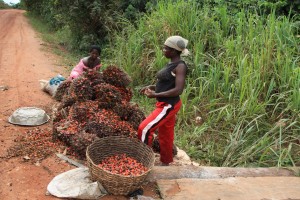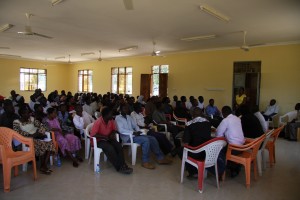Regional Partnership to Promote Trade & Investment
To trade, countries need the productive capacity to produce goods and services that are in demand and that can be competitive in world markets. Countries of the sub-Saharan region are particularly handicapped because of a lack of productive capacity, especially outside the natural resources sector. Key to building this capacity is the creation of a vibrant enterprise sector, the bedrock of economic development. Both domestic and foreign direct investment (FDI) can play an important role in meeting this challenge, by contributing directly to the creation of productive capacity and, in the case of FDI, by serving as a catalyst for the growth of domestic enterprises.

Many sub-Saharan secondary cities, typically of medium size and severely under-resourced, are growing rapidly, including by absorbing an increasing number of people leaving the countryside. A special effort needs to be made to help these cities increase their levels of productive investment in order to put them on a sustainable development path and so they might participate in and benefit from global trade. Importantly, these secondary cities are often quite large and offer a range of commercially viable investment opportunities that need to be identified and brought to the attention of local and foreign investors — within the country, within the region and internationally.
The capacity of cities to attract investors therefore needs to be built up, so that cities can better attract and then service investors. Business linkages to existing investors also need to be strengthened for the cities/countries to benefit maximally from each investment. To maximize this impact, the capacity of local enterprises, too, needs to be strengthened, with a special focus on providing access, opportunity and relevant training to women entrepreneurs.
Regional Partnership to Promote Trade and Investment in Sub-Saharan Africa
This program was established in April 2011 with funding from the Government of Finland and was implemented by MCI and the three participating cities, in collaboration with The World Agroforestry Centre (ICRAF), an international research organization headquartered in Nairobi, Kenya.
Click here to access the “Regional Partnership to Promote Trade and Investment in Sub-Saharan Africa: Final Narrative Report,” prepared by former MCI Senior Researcher and Advisor Dr. Karin Millett in consultation with the Millennium City Investment Teams in Kumasi, Mekelle and Tabora.
Project Goals
The project aimed to:

- Assist three Millennium Cities — Tabora, Tanzania; Mekelle, Ethiopia; and Kumasi, Ghana — in generating more investment (local and foreign), to build up their productive capacity and their ability to trade, thereby accelerating their progress toward achieving the MDGs; and
- Contribute to the global dialogue on the importance of increasing sustainable investment at the sub-national (cities/regional) level.
Outputs and Outcomes
The key deliverables of the project included:
- The identification of a number of significant, viable investment opportunities in and around each of the three selected cities and the production of materials for promoting and targeting these and other opportunities. These materials include:
- Investment guides: Invest in Ethiopia: Focus Mekelle; Invest in Ghana: Focus Kumasi; Kumasi Abridged Investment Guide 2013 and Invest in Tanzania: Focus Tabora
- Profiles of specific investment opportunities in Kumasi, Mekelle, and Tabora
- Websites for two of the Regional Partnership cities, Kumasi and Tabora, and one Millennium City, Blantyre (as a Millennium City, Blantyre benefited from the experience gained under the Regional Partnership)
- Condensed promotional brochures: Invest in Tabora, Tanzania; Kumasi, Ghana: Opportunities for Investors; Mekelle, Ethiopia: Opportunities for Investors
- The dissemination of these materials via mail, internet and through local and international events. In addition to mailings and the websites listed above, each of the cities held an investment forum in 2013. See event programs and resources:
- Kumasi Forum:
- Kumasi Forum Program
- Investment Profiles: Bamboo Cultivation, Fruit Processing, Real Estate, Multi-Story Car Park, Oil Palm Cultivation, University Staff Housing, University Student Housing.
- Kumasi Investment Forum presentations: Regional Partnership to Promote Trade & Investment in Sub-Saharan Africa Presentation, A Presentation on Bamboo Bikes Limited (BBL), Regulatory Framework for Investing in Ghana, Investment Opportunities In and Around Kumasi, A Partnership for Development of Staff and Student Accommodation on KNUST Campus, MASIG Natural Fruits Industries Limited, West African Health Foundation Specialist Hospital, ADM Cocoa Ghana: An investment success story in Kumasi, Stool Land Administration in Kumasi, Investing in Kumasi.
- Mekelle Forum:
- Mekelle Forum Program
- Investment Profiles: Beekeeping, Animal feed production, Pharmaceutical formulation plant, Production of essential oils.
- Mekelle Investment Forum presentations: Mekelle Investment Day: A Summary, Mekelle Investment Profile, Opportunities for Investment and Business Development in Mekelle, Tigray, Overview of Ethiopian Investment Policy, Mekelle Investment Day: Addis Pharmaceutical Factory, Flow Equity, Business Investment Opportunities in Mekelle.
- Tabora Forum:
- Tabora Forum Program
- The report on Tabora’s forum
- Investment Profiles: Honey and Beeswax, Dairy, Meat, Sunflower, Tropical Fruits, Tourism.
- Tabora Investment Forum presentations: Introduction, Remarks by Hon. Mwassa, Remarks of Simon Mapolu, Remarks by Peter Chisawillo, Remarks by Dr. Mhoamed Gharib Bilal, Transportation Challenges and Achievements in Tabora Region, Investment Possibilities in Tabora, Investment Incentives in EPZs and SEZs, MCI and Promoting Private Sector Development, Financing Through Dar es Salaam Stock Exchange, Tabora Opportunities for Investment, KPMG’s Involvement in Promoting Investment in Tabora, Promoting Trade and Investment in Sub-Saharan Africa, Presentation on Tabora and Government Initiatives, Deliberations of Tabora Investment Forum, Closing Remarks.
- Kumasi Forum:
- The Regional Partnership Capstone Seminar concluded activities and provided a space for all parties to share experiences. Materials from the event included:
- Dr. Susan Blaustein’s Capstone Remarks
- City Investment Promotion Models
- Implementation of the Regional Partnership to Promote Trade and Investment in Sub-Saharan Africa: Tools and Process
- Kumasi’s Participation in the Regional Partnership to Promote Trade and Investment in Sub Saharan Africa Program
- Regional Partnership to Promote Trade and Investment in Tabora
- Mekelle MCI Investment Report Capstone Conference
- The strengthened capacity for local investment promotion, facilitation and trade, including also an established public-private sector dialogue mechanism;
- A strategy paper intended as a methodological tool enabling cities/regions to formulate their own programs to attract sustainable local and foreign investment, published as part of the Handbook for Promoting Foreign Direct Investment in Medium-Size, Low-Budget Cities in Emerging Markets (see Module IV on strategy).
- A guidance paper on attracting in particular sustainable FDI for the cities/regions at the sub-national level by Georgetown University Professor John Kline;
- A report detailing lessons learned in the course of the two-year collaborations;
- A substantial contribution to the international work on FDI.
In addition, a number of training materials, tools and resources were developed and identified to support learning by cities in the promotion of private sector investment, both domestic and international.
Tools:
- “Overview of Investment Promotion,” August 2013
- “Building an Investment Promotion Website at the Sub-National Level: A Step-by-Step Guide,” August 2013
- “An Essential Guide to SWOT Analysis,” June 2015
Presentations:
- Follow Up on Investment Promotion Events, Karin Millett/Rene Samek, August 2013
- Attracting Productive Private Sector Investment, Rene Samek May 2012
- Decision-making Process of Investors and Site Selection, Rene Samek, May 2012
- Developing an Investment Promotion Strategy and Action Plan: Understanding Your Location, Karin Millett, May 2012
- Edible Oil – the Case of Palm Oil, Joerg Simon, May 2012
- Image-building and Marketing Your Location, Rene Samek, May 2012
- Objectives, MCI’s Approach, City Investment Promotion, Joerg Simon, May 2012
- How to Prepare an Offer to Potential Investors, Rene Samek, March 2012
- How to Select and Approach Potential Investors, Rene Samek, March 2012
- What Do Investors Need to Make a Decision?, Rene Samek, March 2012
- Techniques for Attracting Private Sector Investment, Karin Millett/Joerg Simon, January 2012
- Attracting Private Sector Investment at the City Level – Mekelle, Karin Millett, May 2011
- SWOT Analysis Purposes and Guidelines, Karin Millett, May 2011
- Strategy Guidance Paper, Karin Millett, April 2011
- Tools for Targeting and Winning Investment, Karin Millett, April 2011
- City of Tabora: Workshop on Tools and Techniques of Attracting Productive Private Sector Investment, Karin Millett, Joerg Simon, Deo Msilu, January 2011



